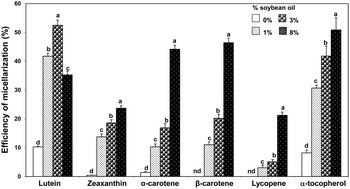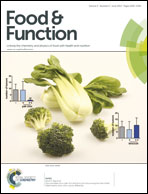Unsaturated fatty acids promote bioaccessibility and basolateral secretion of carotenoids and α-tocopherol by Caco-2 cells
Abstract
Bioavailability of carotenoids and tocopherols from foods is determined by the efficiency of transfer from food/meal to mixed micelles during digestion, incorporation into chylomicrons for trans-epithelial transport to lymphatic/blood system, and distribution to target tissues. Fats and oils are important factors for facilitating the absorption of lipophilic compounds. However, dietary fats and oils are composed of various types of saturated and unsaturated fatty acids which may differentially impact the bioavailability of carotenoids and tocopherols from foods. We have investigated the effects of several common commercial lipids on bioavailability using an in vitro digestion model and Caco-2 human intestinal cells. Meals consisted of mixed salad vegetables containing a single test lipid. Micellarization and cellular uptake of β-carotene (βC) and lycopene (LYC) during small intestinal digestion was increased by lipids rich in unsaturated fatty acids: soybean oil > olive > canola > butter. In contrast, type of lipid minimally affected the bioaccessibility of lutein (LUT) and zeaxanthin (ZEA). To examine the influence of type of dietary triglyceride on uptake and basolateral secretion of carotenoids, Caco-2 cells grown on Transwell membranes were incubated with micellar mixtures of fatty acids (1.0 mM) mimicking the types and ratio of saturated to unsaturated (mono- + poly-unsaturated) fatty acids (FA) present in butter (70 : 30), olive oil (7 : 93) and soybean oil (11 : 89). Cells were exposed to micelles containing βC, LUT, α-tocopherol (α-TC) and a mixture of test fatty acids. Uptake and basolateral secretion of βC, LUT and α-TC were greater in cells pre-treated with mixtures enriched in unsaturated compared to saturated FA and these effects were mediated by increased assembly and secretion of chylomicrons. These results suggest that dietary fats/oils rich in unsaturated fatty acids promote carotenoid and α-TC bioavailability by enhancing their micellarization during digestion and intestinal transport.


 Please wait while we load your content...
Please wait while we load your content...